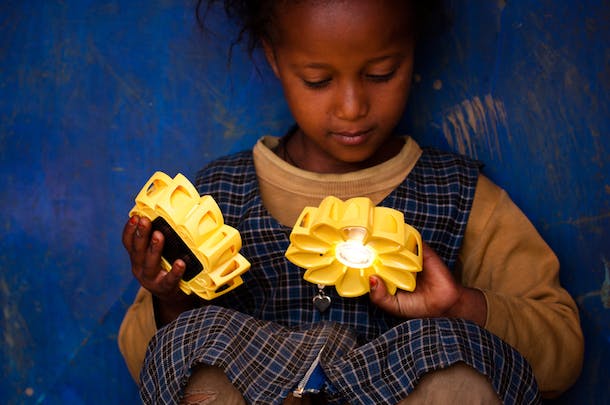
This year’s annual letter from Bill and Melinda Gates performed a great service: It elevated access to energy to a superpower – like being able to fly or run at supersonic speed. That’s exactly right: Energy empowers people. It enables them to do more with less work.
Last year all the countries in the world agreed to a set of Sustainable Development Goals. Goal 7 is to “ensure access to affordable, reliable, sustainable and modern energy for all” – in other words, universal energy access, including provision of electricity to every home and community globally by 2030. This means reaching 1.1 billion people who do not have the benefits of electricity in their homes, their health clinics and hospitals, their schools, and their businesses.
The good news is that all the solutions we need are already commercially available, and in use. They just need some more “superpower” to be scaled quickly and efficiently.
When combined with the best of the new super-efficient appliances like LED televisions, LED lights, and other low-energy appliances, along with smart data and increasingly mobile money, small-scale renewable energy solutions can get us to the finish line with the right combination of political will, sound policy, and more targeted financing that helps innovative solar and other clean energy solutions providers to bring their approaches across the world – whether tied to an existing grid (and improving the quality of power) or provided on a stand-alone basis, or in a community setting as a “micro-grid.”
At the smallest scale, a solar light that helps a child to study at night is already commercially available for under $5. That is something we can bring even to the very poorest homes globally, even as national grids continue to be extended, but take more time.
People don’t have to wait for their power – they are empowering themselves in the millions through the purchase of solutions ranging from the smallest lights to larger solar home systems, solar rooftops, community-based systems, even while waiting for national electrical grids to be extended as far as they can.
Last year the United Nations Foundation surveyed companies in the off-grid energy access sector and found that they are already serving millions of customers a year, and that financing – structured in the right way, at the right time, and of course in the right amount – can be game-changing for their ability to scale their solutions. To learn more about this, please visit www.energyaccess.org.
Of course, the very poorest cannot afford these market solutions, and not every problem can be solved by business alone. That is why we need good policy, good politics, and financing to help address the areas where public funding is needed – such as in hospitals and front-line health clinics where women too often are still giving birth with the fumes of a candle or kerosene light being the first breath their baby takes.
Let’s take advantage of the under-utilized resource of women to deliver these solutions around the world, embracing the amazing assets of our young women engineers, technology specialists, and policymakers to ensure that not only are women benefiting from the solutions provided, but that women are the solution providers – giving them the superpowers of time and energy.



 View All Blog Posts
View All Blog Posts